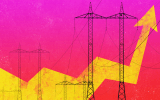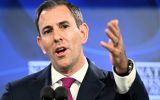


Treasurer Jim Chalmers is in Beijing for a two-day trip that leading experts say will focus on China’s slowing economy and negotiations about trade tariffs.
The high-level talks at China’s National Development and Reform Commission will be the first in seven years after the Albanese government repaired ties with Australia’s largest trading partner.
In fact, Chalmers is the first Australian Treasurer to visit China since Scott Morrison held the role.
But while Chalmers talks up improved relations, the meetings will be tougher behind closed doors, where differences on investment policy and anxieties from both sides about trade will be voiced.
Australian National University research fellow Benjamin Herscovitch said Chalmers will seek reassurance from officials on the outlook for commodity exports as China’s economy struggles.
China, meanwhile, will continue to urge Australia not to follow the US in imposing tariffs on exports such as electric vehicles, and allow Chinese investors into our critical minerals industry.
“What’s happening in China with their housing industry and infrastructure spending more broadly has massive ramifications for Australia in terms of the price of iron ore,” Herscovitch said.
“Chalmers is watching all of these economic tremors coming out of China with a great deal of worry.”
These are the key items on the Treasurer’s agenda.
1. Chinese economy
Economists say China will struggle to achieve growth targets this year as its economy slows, with its central bank cutting interest rates in an attempt to boost household consumption.
Commonwealth Bank economists say the cuts will boost per person average annual disposable income in China by 0.25 per cent.
That will help lift demand, but additional stimulus is still needed.
“We continue to expect the government will deliver more fiscal stimulus soon,” CBA economists said on Thursday.
“The sense of urgency signalled at the joint press conference this week suggests a fiscal package may be in the works.”

China’s woes have a clear impact on Australia, particularly the federal budget, which Chalmers has said could lose $4.5 billion from falling commodity prices, including iron ore and lithium.
“We’ve seen a weakness in the Chinese economy, which obviously has consequences for us,” Chalmers said before the talks.
“We’re not immune from weakness in the Chinese economy. That’s why it’s so important that over the next two days I’ll be meeting with key Chinese counterparts in Beijing.”
Australia-China Relations Institute director and UTS professor James Laurenceson said China’s economy will be the first priority.
The good news is that while commodities prices are falling from earlier highs, volumes of key exports like iron ore are still sitting near record levels, pointing to a robust underlying demand.
“It’s a complicated picture,” Laurenceson said.
“Some areas of trade are absolutely booming … in the last three months, we’ve exported more than $400 million worth of wine in China.”
2. Lobster exports
Second on Chalmers’ agenda will be negotiations over remaining restrictions Beijing has on Australian exports, namely lobster.
A defrosting of relations between Canberra and Beijing since the Albanese government took office has resulted in most of the tariffs China put on Australian goods in 2019 being discarded.
But lobster farmers are still dealing with the remnants of the spat.
Laurenceson said Chalmers will push Beijing for those issues to be resolved before Trade Minister Don Farrell visits in November for an international trade expo in Shanghai.
“By then, surely, those restrictions are going to have to come off,” he said.
“Otherwise, it’s going to be a very uncomfortable trade position for our trade minister to be in later this year.”

3. Trade policy
Also expected to be raised during the meetings is trade policy more broadly, with Beijing seeking firm assurances from Canberra that it will not back widening US tariffs against Chinese goods.
As TND has explored, Canberra is under pressure from Washington to take a more protectionist stance on China in areas such as electric vehicles and related goods like lithium-ion batteries.
Herscovitch explained that the US wants to secure international support for tariffs on key Chinese goods.
But Chalmers should be able to give trade assurances to China because Australia has already criticised the US tariffs, with Farrell calling them “draconian”.
Laurenceson said Australia has distanced itself from US trade policy.
“We’re clearly not in the same boat as the US,” he said.
“There’s no talk in Australia about putting 100 per cent tariffs on EVs like the US and Canada have.”
4. Investment
Canberra’s opposition to US trade policies is welcomed by Beijing but Herscovitch said officials will “push hard” on taking a more open approach to Chinese investment in critical mineral mines.
The Albanese government has rejected two prospective critical mineral projects over the involvement of Chinese investors and has issued divestment orders for other mines.
“The government doesn’t come out and say this publicly, but it seems like the Albanese government has in place a de facto ban on significant new Chinese investments in the Australian critical minerals industry,” Herscovitch said.
Complicating things for Chalmers, the foreign investment rejections are ultimately a ministerial decision, meaning he won’t be able to deflect responsibility for the decisions during the talks.
Nevertheless, the Treasurer is not expected to shift Australia’s position on the issue.
“Our approach to China has been to co-operate where we can, disagree where we must, but always engage in Australia’s national interest,” Chalmers said.

5. Consular cases
Though trade and economic issues will be the focus of Chalmers’ talks in Beijing this week, he’s also expected to raise several consular cases with his Chinese counterpart.
That includes the imprisonment of Australian citizen Yang Jun, which Foreign Minister Penny Wong also raised this week with China’s foreign minister Wang Yi at the UN in New York.
“The weight of his attention will be on economic issues, but I expect he will raise consular cases,” Laurenceson said.
Shadow Treasurer Angus Taylor said Chalmers should raise human rights issues with his counterpart in Beijing.
“Trade relationships are hugely important, but we should do that at the same time as putting a line in the sand on those crucial national security issues, and it’s about getting that balance right,” he said.










